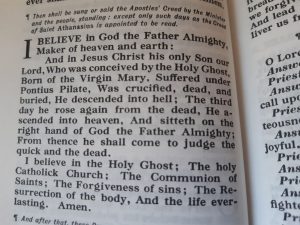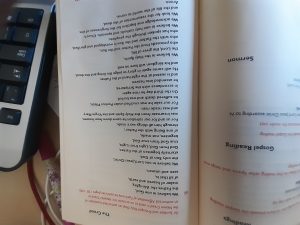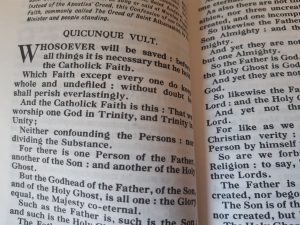2 Corinthians 13:1-11 and Matthew 28:16-20
Link to Video Reflection by Alison Way https://youtu.be/Y5qKTlJpMPM
Link Video to Reflection by Bishop Peter https://youtu.be/oBpOpp2wL3Q
Trinity Sunday – 2 Corinthians 13:11-end, Matthew 28:16-20
In the name of God, father son and holy spirit- Amen
That line I have just said is so familiar that we tend to forget how important it is. It describes the 3 aspects of God, the 3 persons of what is a churchy word – the three persons of the trinity. Where God is our father and creator, Jesus is the son, who saved us, and the Holy spirit is the presence of God within us to help us and sustain us.
These are three things all mixed up together – all essential to the whole, and all making up the whole. To help us think about this all this– the concept of God as Trinity I want to start by thinking about one of these the humble mars bar.
Here’s one all wrapped up and here’s one I cut in half earlier – So we can see that like the Trinity there are three parts of a mars bar.
-
First there is the chocolate round the outside
-
Second there is the gooey caramel layer
-
Finally then a layer nougat which gives structure and substance.
To make a Mars, it works the other way round – you start with the nougat, put the caramel on top and then cover it with chocolate!! Okay I want us to think about eating a mars bar now. I appreciate it is probably a bit early for a seriously sugary snack – but please humour me. We could probably just eat the chocolate, without touching the other parts. Gentling nibbling the chocolate off the outside – (as a child I used to be rather fond of eating club biscuits like that!). But it would be very difficult to avoid getting a little bit of the nougat or the caramel with it!!!
Now what about if I asked you to just eat the caramel or the nougat without touching the other parts. That’s a bit more difficult! I could possibly manage it with a knife and a lot of effort, but without that pretty impossible. And in a way this mars bar is showing us how difficult it is to separate the layers from one another – As it is designed to all be eaten together.
And so it is with God – there are many layers to God – as Father, the Son and the Holy Spirit – And we are not designed to separate them either. But understand them as part of the whole. If you understand the chocolate as the Holy Spirit – God’s presence with us day by day. That’s the way in to understanding our spiritual dimension of our lives – our way of connecting with God the Father and his Son. We access Jesus through the power of the Spirit (or the chocolate in my mars bar thoughts). The caramel being Jesus and the nougat being God the Father are who we experience through the chocolate of the Holy Spirit – Inseparable from each other, the son relying on the creative substance of the Father – with the caramel layer on top of the nougat.
It may surprise you to realise this understanding of how God as Father, Son and Holy Spirit is very rarely brought together in our Bibles. The end of our reading from 2 Corinthians 13 is one of the very few places that bring this together. This is the Biblical basis of the words of the grace we use frequently today. I do think it is surprising that something so important to us is so sparcely present in scripture. One of the other places it is brought together like this is about baptising in our reading from Matthew’s gospel, in the great commission Jesus instructing us to baptise as we do in the name of the Father, of the Son and of the Holy Spirit..
Having established the idea of the Trinity is not particularly Biblical in origin, it is wisdom brought to us over the years through the development of the early Church. In fact the history at this point is quite entertaining, with disagreements and power struggles and a lot of human nature, with which we are well versed from our day. Differences of opinion in the Church have been very common from the earliest days.
I think it is interesting – if again possibly surprising that the statements of faith we routinely use – things we would call our creeds also come from so long ago.
 The Apostle’s creed is the simplest and the earliest formed around 150 years after Jesus birth. It was a response to a need to write things down and agree what Christians believe. This is the one we often say in services of morning or evening prayer in our Church, and begins I believe
The Apostle’s creed is the simplest and the earliest formed around 150 years after Jesus birth. It was a response to a need to write things down and agree what Christians believe. This is the one we often say in services of morning or evening prayer in our Church, and begins I believe
The Nicene creed we know was finished around 425 years after Jesus birth. It  took 125 years editing and discussion to reach the version we would recognise from a communion service in our Church, and begins We believe
took 125 years editing and discussion to reach the version we would recognise from a communion service in our Church, and begins We believe
There is another creed that comes in between those 2 in history and is in the book of Common Prayer – particularly recommended for Trinity Sunday (and some other festivals). Had I been leading a Book of Common Prayer service today, I would have got us to say it I wonder if anyone hearing this has ever grappled with it!! Please don’t worry if the answer to this is No! – I have been teaching Church History on a course for people thinking about ministry in many different forms for the last few years – and they had never heard of it either.
 It is commonly called the creed of St Athanasius – a key character in the wrangling about how to describe God I have previously described. In a moment there will be an opportunity to say it with me. It has never been updated to more modern language which again has diminished the number of times it is used.
It is commonly called the creed of St Athanasius – a key character in the wrangling about how to describe God I have previously described. In a moment there will be an opportunity to say it with me. It has never been updated to more modern language which again has diminished the number of times it is used.
I will pop up at the end and say a little more about it and our readings, so when we get to the end of the creed please don’t stop the video!!
Quicunque Vult
Whosoever will be saved: before all things it is necessary that he hold the Catholick Faith.
Which Faith except every one do keep whole and undefiled: without doubt he shall perish everlastingly.
And the Catholick Faith is this: That we worship one God in Trinity, and Trinity in Unity;
Neither confounding the Persons: nor dividing the Substance.
For there is one Person of the Father, another of the Son: and another of the Holy Ghost.
But the Godhead of the Father, of the Son, and of the Holy Ghost, is all one: the Glory equal, the Majesty co-eternal.
Such as the Father is, such is the Son: and such is the Holy Ghost.
The Father uncreate, the Son uncreate: and the Holy Ghost uncreate.
The Father incomprehensible, the Son incomprehensible: and the Holy Ghost incomprehensible.
The Father eternal, the Son eternal: and the Holy Ghost eternal.
And yet they are not three eternals: but one eternal.
As also there are not three incomprehensibles, nor three uncreated: but one uncreated, and one incomprehensible.
So likewise the Father is Almighty, the Son Almighty: and the Holy Ghost Almighty.
And yet they are not three Almighties: but one Almighty.
So the Father is God, the Son is God: and the Holy Ghost is God.
And yet they are not three Gods: but one God.
So likewise the Father is Lord, the Son Lord: and the Holy Ghost Lord.
And yet not three Lords: but one Lord.
For like as we are compelled by the Christian verity: to acknowledge every Person by himself to be God and Lord;
So are we forbidden by the Catholick Religion: to say there be three Gods, or three Lords.
The Father is made of none: neither created, nor begotten.
The Son is of the Father alone: not made, nor created, but begotten.
The Holy Ghost is of the Father and of the Son: neither made, nor created, nor begotten, but proceeding.
So there is one Father, not three Fathers; one Son, not three Sons: one Holy Ghost, not three Holy Ghosts.
And in this Trinity none is afore, or after other: none is greater, or less than another;
But the whole three Persons are co-eternal together: and co-equal.
So that in all things, as is aforesaid: the Unity in Trinity, and the Trinity in Unity is to be worshipped.
He therefore that will be saved: must thus think of the Trinity.
Furthermore it is necessary to everlasting salvation: that he also believe rightly the Incarnation of our Lord Jesus Christ.
For the right Faith is that we believe and confess: that our Lord Jesus Christ, the Son of God, is God and Man;
God, of the Substance of the Father, begotten before the worlds: and Man, of the Substance of his Mother, born in the world;
Perfect God, and Perfect Man: of a reasonable soul and human flesh subsisting;
Equal to the Father, as touching his Godhead: and inferior to the Father, as touching his Manhood.
Who although he be God and Man: yet he is not two, but one Christ;
One, not by conversion of the Godhead into flesh: but by taking of the Manhood into God;
One altogether, not by confusion of Substance: but by unity of Person.
For as the reasonable soul and flesh is one man: so God and Man is one Christ.
Who suffered for our salvation: descended into hell, rose again the third day from the dead.
He ascended into heaven, he sitteth on the right hand of the Father, God Almighty: from whence he shall come to judge the quick and the dead.
At whose coming all men shall rise again with their bodies: and shall give account for their own works.
And they that have done good shall go into life everlasting: and they that have done evil into everlasting fire.
This is the Catholick Faith: which except a man believe faithfully, he cannot be saved.
Glory be to the Father, and to the Son: and to the Holy Ghost;
As it was in the beginning, is now, and ever shall be: world without end. Amen.
So there you have it – the Athanasian creed, in short, it contains a more complete description of the Trinity in all its wonder and mystery and it doesn’t mince on the difficulty we have in understanding the interrelationships between God the Father, God the Son and God as Holy Ghost, and as we have said it we will probably said more incomprehensibles and uncreated than we have said all year!!
The Athanasian creed is a human attempt, with some technical and difficult language but a pretty comprehensive attempt to pin it all down and explain it – but it is limited by our humanness! One of the things it most helpfully does is that it serves to help us realise that we don’t understand and perhaps in this life that we never will understand fully how God is. Because there is always more too it, more layers and more complexity to grasp. Many of our attempts to define God put false limits in place, to what human minds can conceive and hold on to. There is always more to this and more and then yet more. We are linear which also makes our understanding partial, God is the same, yesterday, today and forever. It is as the creed so repeatedly puts it – uncreate and incomprehensible – Where as we are time limited as created beings to what is created and what we can comprehend
There is no way to define clearly what God is all about. Thank goodness defining where God is concerned really isn’t our role, loving worshipping and serving God is…
I think St Paul in our first reading today puts into context what our loving, worshipping and serving of God should look like in response to God’s amazing love for us as creator, redeemer and sustainer. In Verse 11 it says three things that I think are particularly important for us today.
Firstly put things in order – Get our priorities straight – love God and love our neighbour, God’s will and God’s kingdom not ours.
Secondly Listen to my appeal – pay attention and live by the wisdom and guidance of the scripture, and of the Holy Spirit in our lives. Be loving, be kind – so important in times like ours.
And finally Live in peace – be a peacemaker, a peacebringer and as the prayer of St Francis has it – make me a channel of your peace.
In our Christian faith is a wealth of peace that we know through God’s presence with us. Peace that has been guarding, guiding and inspiring us in these lockdown days. For me this has been peace that has been essential to our well-being. We have all had wobbly days I suspect, but God’s peace is a steading force to help us through the Holy Spirit with us.
Behind the scenes we are looking at how, when and in what ways we can use our buildings moving forward, and I am very grateful for the teams in both Wincanton and Pen Selwood who are helping with this. We are reliant on the National Church and our diocese for guidance on this matter. I am now also very conscious that this is not an easy task, and that there are layers of guidance, risk assessments and practical tasks to wade through. There will be difficult choices to make in this and for all of us one way or another. And what we can do, when we can will look different from how it has done up to this point. We really need to stay well connected with the peace of God over this and how best to proceed so we can worship together our God as Trinity – Creator, Redeemer and Sustainer. Connecting with this peace, the peace of God that is beyond our understanding, is what matters in all of this.
I am going to end with some hymn words – another of my many favourites – which if we were singing we would probably have sung today today. This is excerpt from St Patrick’s breastplate. I am going to put the words on the screen so you can say them with me if you wish.
I bind unto myself today
the power of God to hold and lead,
God’s eye to watch, God’s might to stay,
God’s ear to hearken to my need,
the wisdom of my God to teach,
God’s hand to guide, God’s shield to ward,
the word of God to give me speech,
God’s heavenly host to be my guard.
5 Christ be with me, Christ within me,
Christ behind me, Christ before me,
Christ beside me, Christ to win me,
Christ to comfort and restore me.
Christ beneath me, Christ above me,
Christ in quiet, Christ in danger,
Christ in hearts of all that love me,
Christ in mouth of friend and stranger.
6 I bind unto myself the name,
the strong name of the Trinity
by invocation of the same,
the Three in One and One in Three,
of whom all nature has creation,
eternal Father, Spirit, Word.
Praise to the Lord of my salvation;
salvation is of Christ the Lord! AMEN
References: Text from The Book of Common Prayer, the rights in which are vested in the Crown – is reproduced by permission of the Crown’s Patentee, Cambridge University Press.
Hymn words via CCLI 217043
New Revised Standard Version Bible: Anglicised Edition, copyright © 1989, 1995


